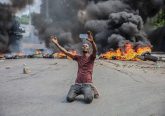Pakistan has always been a divided nation—divided between the forces of progression and regression, between secularists and the rest, between those who believe in social equality and those who don’t. Three days before Pakistan gained independence in 1947, Jinnah, the founding father, made clear that religion would have “nothing to do with the business of the state.” Yet, within a year after his death, the Mullahs prevailed. TheObjectives Resolution, passed by the Constituent Assembly in 1949, laid the basis of an Islamic Republic where religiosity has progressed with every passing decade, culminating in its current violent form.
Resistance to religiosity in the country has also been constant. Zulfikar Ali Bhutto, the first elected prime minister, attempted liberal socialism in the 70s, but had to succumb to the religious right and was finally hanged by an Islamist general. His daughter, Benazir, struggled for progressive politics since the 80s, until her fateful assassination in 2007.
The alternatives are well known. In their attempt to impose Sharia in the past decade, Taliban extremists have silenced thousands of lives. Yet saner voices continue to emerge to champion national struggle against religious bigotry.
Malala Yousafzai, the survivor of Taliban assassination bid last year, is the latest exponent of this just cause. With the late Benazir as her role model, the 16-year-old girl from a rural town says she wants to become the prime minister of Pakistan.
On 7th December, she spoke at the Oxford Union: “Before, I wanted to become a doctor, but now I think, as a politician, I will be able to help the whole population.” Malala had a rare supporter in the audience. Asifa Bhutto, Benazir’s youngest daughter and one of her potential successors, promised to “vote for her whenever she contests elections.”
Five years ago, when the Swat region came under Taliban occupation, Malala wrote a blog in the BBC Urdu website under pseudo name Gul Makai, sharing with the world her innocent tales of fear and helplessness, courage and passion. She was already quite vocal in local media, and her passion for education under dire circumstances was captured in two documentaries made by New York Times reporters. But little did she realise then how costly the price for her youthful activism could be.
Last year, as she laid unconscious in her bed at Queen Elizabeth Hospital in Birmingham after the tragic shooting, my write-up on this blogconcluded with the following lines: “With her courage and sacrifice, Malala has proven that the possibility of change in Pakistan is in plenty. She alone can cause a hundred Arab Springs, and deserves to live a thousand lives. Her sacrifice cannot go in vain. With maturity thrice her age and foresight rare in a visionless state, she is the future for which every Pakistani must crave.”
Since miraculously recovering from near-fatal head injuries, Malala has spread her message of hope and freedom from major global platforms. She has addressed the United Nations, and won several international awards, including the UN Human Rights Award and EU’s Sakharov Human Rights Prize. She was also a favoured nominee for the Nobel Peace Prize. Her co-authored book, I am Malala, has been a best seller.
The youngest ever guest speaker at the Oxford Union captivated the jam-packed audience with her pearls of wisdom and amazing sense of humour. For instance, when asked by panelists how she felt living in Birmingham, she joked about cold and rainy British weather. “In Swat, we always knew there were four seasons in a year: spring, summer, autumn and winter.” She joked about the bond of love between her parents, whom she identified as her key source of inspiration.
However, when it came to globally contested serious issues such as the meaning of power, she was equally forthcoming: “I think that we must change the ideology of being powerful…A country with more literate and educated people, a country with more skillful people, a country which has given equal rights to its citizens should be considered the superpower. Not the country with atomic bombs and millions of soldiers.”
What I personally found most fascinating in her talk was the pragmatic manner in which she clarified the prevailing gap between perception and reality about Pakistan, Islam, Pashtun culture and the West.
She underlined the innate hospitality of the Pakistani people, referring to the time when she and her family were internally displaced during the Swat operation, how fellow Pashtun families never let them feel “homeless.” She also highlighted the bright side of Islam by saying that it “is not only the right but also the duty of every Muslim man and woman to get education…Prophet Muhammad (may peace be upon him) said that even if you have to go to China to seek knowledge then you must go.” About studies at her Birmingham school, she spoke of learning a “great deal about Islam” in addition to other religious faiths.
With a liberal narrative such as this, Malala has challenged the forces of bigotry in her homeland. The Taliban and their political sympathisers have accused the teenage girl of being trapped by the West. After the publication of the book, even her religious belief and national loyalty have been questioned. Such smear campaigns are not unexpected. But her resolve remains unshaken. She pledged in Oxford to use the Global Fund named after her for educating “every deprived girl” across the world, while reiterating that her ultimate goal remains to lead Pakistan.








No Comment